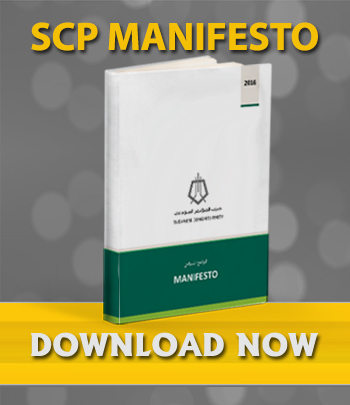POLITICAL VISION
6.1 Political Vision
6.1.1 Ending war and building peace
The matter of the civil war in the Sudan has been a central issue throughout the years of national rule. The Sudanese Congress party has therefore taken up the task of contributing to ending the war by tackling its root causes and building social peace with all that is required to do so, including the following:
● Restructuring the Sudanese state to reflect all its cultural and social components.
● Establishment of a democratic pluralistic federal system, ensuring equitable distribution of `power and
opportunities for development and enrichment throughout the regions of the country.
● Criminal accountability for human rights violations (war crimes, extrajudicial killings, torture) and corruption
offenses.
● Initiation of a comprehensive reconciliation process through transitional justice mechanisms that heal the
wounds and address the physical and psychological abuse of the victims, and compensate them fairly, reveal
the facts and enable the victims to choose between amnesty or recourse to justice for those accused.
● Dissolution of militias, the collection of their weapons and the prohibition of weapons to individuals other
than members of the uniformed forces.
● Constitutional provision for binding the state to international human rights principles
● Recognition of religious, cultural and ethnic pluralism in the country, citizenship being the basis of rights and
responsibilities, and prohibition of discrimination on the basis of religion, culture, race or gender, but
enabling positive discrimination in favour of marginalized groups in transitional situations.
● The recognition of intellectual, verbal and physical differences and disseminating the culture and values of
democracy, peace, compassion and tolerance.
● The Constitution provides that no laws may be enacted that violate the freedom of conscience, freedom of
worship or freedom of scientific research, and that no laws may discriminate against women or against any
group because of their religious, cultural or ethnic affiliation
● To combat any form of racism, slavery and take serious practical steps to achieve genuine equality amongst
the people of the country.
● Purging of the educational curriculum by removing all materials and writings of a narrow ideology.
● Rebuilding of our image in the media so as to promote a culture of peace and the values of democracy,
compassion and tolerance.
● Addressing the situation of internally displaced persons and refugees, their resettlement and the provision of
stable and continuous services and means for productive livelihoods.
● Attracting international assistance and support for resettlement and rehabilitation programs.
● Attracting Sudanese diaspora support for rehabilitation programs.
6.1.2 Transitional Arrangements:
Whether change is brought about through popular revolution, or by any other means, the Sudanese Congress party has adopted a transitional period of four years’ duration so as to make arrangements focused on maintaining the security and safety of citizens, to manage their affairs in order to secure their personal safety, their property, clothing and sustenance and following up with further stage of drafting a permanent constitution for the country and the institutional reform of the legal, political and social structures.
6.1.3 Civil Service:
● The civil service is an independent and impartial body that serves all citizens on an equal footing. To enable
that the rule of law must prevail and a democratic will be established to protect it from totalitarianism.
● Appointments in the civil service shall be on the basis of competence, and fair representation of all nationalities
and regions of Sudan. The principle of positive discrimination shall be applied in the years of transition to
address the historical imbalance which has removed many social groups and categories of people.
● The structures and systems of the administrative apparatus are linked to the national and developmental
objectives of the State and its overall policies.
● Establish commissions with legal authority in accordance with special laws so that they can supervise, follow up
and protect the various civil service institutions.
6.1.4 Statutory Bodies:
● The armed forces, the civilian police and the security apparatus are national and professional bodies that are
subject to and comply with the laws and regulations of the country.
● Disbanding of all the militias and collecting their weapons and reintegrating their fighters into civilian and
military life in accordance with agreed terms and conditions.
● The security services are under the state's political authority and its tasks are limited to gathering intelligence,
analyzing it and providing the state authorities with input and advice.
● Rationalization of disbursements to institutional bodies in such a way that ensures the appropriate
remuneration for the employees, which corresponds to the importance of their assigned roles and upgrading of
their training in accordance with the latest materials and knowledge available.
● Incorporating a human rights curriculum into training courses for all statutory bodies and raising the awareness
of employees to legal and human rights issues.
6.1.5 Land Issues:
The issue of land ownership is one of the sources of conflict in Sudan, so the Sudanese Congress party is working to find a radical solution to this issue through the following principles:
● The state is the geographical entity to which the people have agreed upon and within which the free,
leasehold or land-tenure laws must be actioned, as the case may be, for the general benefit of the society
and that do not infringe upon the rights of individuals or groups.
● Establishment of an independent land commission to arbitrate civil disputes over land ownership.
● Conduct a comprehensive review of land ownership laws through a process of broad public participation.
6.1.6 Protecting the Environment:
Achieving sustainable development is one of the most pressing challenges posed by environmental pollution, wasteful and senseless problems with natural resources. We are seeking the rational utilisation of our natural resources from the point of view of society as a whole and in the interests of future generations. The State takes legislative and institutional measures to protect the environment, works to create public environmental awareness includes environmental issues in the curriculum. Moreover, the state benefits from voluntary effort, especially environmental protection organizations and youth organizations, and in cooperation with international bodies, seeks to raise awareness amongst the community and find solutions to the environmental problems faced in Sudan such as: Desert encroachment, water pollution, soil erosion and destruction and industrial residues, as well as ensuring the protection of wildlife endangered as a result of war and indiscriminate hunting.
6.1.7 The Media:
The use of nationalism by the media agencies of the State has made it seem to be a reflection of the current situation of the Sudanese people and the language of the Sudanese nation, rather than just exclusively that of the government or the organization’s particular culture. The party is simultaneously working to consolidate and strengthen the principle of freedom of expression and respect for the other’s opinion, whilst entrenching the principle of renouncing violence, whatever the reasons for it, we in the Sudanese Congress party believe that the media should be active in:
6.1.7.1 Spreading and publicizing our cultures to the world and contributing to developing them:
● Publicising of Sudanese cultures, their diversity and their multiplicity of sources.
● As a subject of peaceful dialogue and cultural debate.
● To affirm the freedom of the media message and its dissemination and the freedom to own its institutions
and various media channels: print, audio and video.
● To establish a culture of democracy and the peaceful transfer of power.
● E-Emphasizing the participation, transparency and oversight of State institutions.
● Affirming human rights in accordance with international standards and working to protect society from any
violations.
● To support the positive values among the citizens of honesty, integrity and hard work and to spread hope
for the possibility of a change for the better.
6.1.7.2 Therefore, the Sudanese Congress party deems it necessary to:
● Establish a state owned media and communications agency
● Freedom of the press, print and audio-visual media;
● Freedom of expression and the possession of their means of dissemination through, print, audible and
visual channels.
6.1.8 Foreign Policy:
The Sudanese Congress Party perceives it foreign policy relations based on the following principles:
● Our self-awareness and pride in our traditions should not be a cause for intolerance and isolation, nor a
rejection of our humanity, nor to prevent us from cooperation with other peoples from the position of parity
and reciprocal giving. We seek to exchange benefits, trade, experience, knowledge and friendship with all
peoples.
● Our Foreign policy is based on the interests of the people of Sudan and is founded on sincerity and
responsibility towards the destinies of the people and the nation.
● Benefiting from the multifaceted cultural composition of Sudan to be doubly effective in our strong relations
with the Arab and African worlds.
● Based on the principle of unity of the Sudanese people in the two parts of the country, we are working to
establish a Sudanese federation between the Independent States of Sudan and South Sudan.
● Attention to establishing healthy relationships with neighbouring countries based on the principle of non-
interference in their internal affairs and economic and social integration with them.
● Supporting a greater role for international institutions and international cooperation in general humanitarian
issues such as the maintenance of peace, the elimination of poverty, the protection of the environment and
human rights, and in the prevention of disasters, epidemics and the fight against terrorism, drugs and
organized crime.
6.1.9 Civil Society:
The party relies on Civil Society to contribute to the positive change in the building of the Sudanese state. By consolidating the values of democracy, human rights and the principles of governance (participation-transparency-accountability and democracy) and peacebuilding.
The party emphasizes:
● The importance of the independence of civil society from the departments of government and party
exploitation.
● Organizations shall operate freely in accordance with the Constitution and the law.
● Organizations can transform into sources of pressure that enables them to influence political decision-
making and contribute to social change.
● To put in place positive voluntary labour laws in accordance with international norms.
6.1.10 Strategic Planning and National Vision:
To develop a national strategic plan that the State undertakes to implement at all levels, embracing a comprehensive development renaissance.


